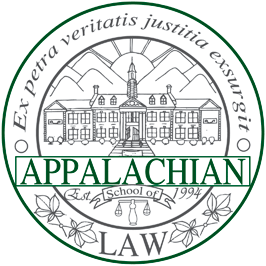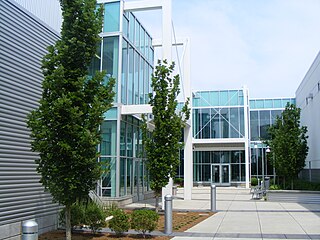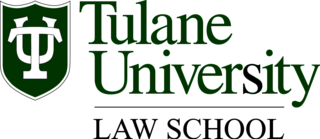
A law school in the United States is an educational institution where students obtain a professional education in law after first obtaining an undergraduate degree.

Admission to the bar in the United States is the granting of permission by a particular court system to a lawyer to practice law in the jurisdiction. Each U.S. state and jurisdiction has its own court system and sets its own rules and standards for bar admission. In most cases, a person is admitted or called to the bar of the highest court in the jurisdiction and is thereby authorized to practice law in the jurisdiction. Federal courts, although often overlapping in admission standards with states, set their own requirements.

The University of Georgia School of Law is the law school of the University of Georgia, a public research university in Athens, Georgia. It was founded in 1859, making it one of the oldest American university law schools in continuous operation. Georgia Law accepted 14.77% of applicants for the class entering in 2023.

The American Bar Association (ABA) is a voluntary bar association of lawyers and law students; it is not specific to any jurisdiction in the United States. Founded in 1878, the ABA's stated activities are the setting of academic standards for law schools, and the formulation of model ethical codes related to the legal profession. As of fiscal year 2017, the ABA had 194,000 dues-paying members, constituting approximately 14.4% of American attorneys. In 1979, half of all lawyers in the U.S. were members of the ABA. In 2016, less than one third of the 1.3 million lawyers in the U.S. were included in the ABA membership of 400,000, with figures largely unchanged in 2024.
Boston College Law School is the law school of Boston College, a private Jesuit research university in Chestnut Hill, Massachusetts. It is situated on a 40-acre (160,000 m2) campus in Newton, Massachusetts, about 1.5 miles (2.4 km) from the university's main campus in Chestnut Hill.
New England Law Boston is a private law school in Boston, Massachusetts. It was founded as Portia School of Law in 1908 and is located in downtown Boston near the Massachusetts Supreme Judicial Court.

The Appalachian School of Law (ASL) is a private law school in Grundy, Virginia. It is accredited by the American Bar Association and offers a three-year Juris Doctor degree to approximately 128 full-time students. The school was founded in 1994 and admitted its first class of students in August 1997. ASL was started and brought to Buchanan County, Virginia as a tool of economic development for the region. ASL emphasizes professional responsibility and alternative dispute resolution in its curriculum.

Southwestern Law School is a private law school in Los Angeles, California. It is accredited by the American Bar Association and enrolls nearly 1,000 students. Its campus includes the Bullocks Wilshire building, an art deco National Register of Historic Places landmark built in 1929. Southwestern is an independent law school with affiliation to the undergraduate program at California State University, Northridge.

The University of Maine School of Law is a public law school in Portland, Maine. It is accredited by the American Bar Association and is Maine's only law school. It is also part of the University of Maine System. The school's current dean is Leigh Saufley, who assumed the post in 2020. Until 1972 the School of Law was located at 68 High Street, Portland. In 1972, the School of Law moved to the University of Maine School of Law Building, which is adjacent to the University of Southern Maine's Portland campus. In 2023, the Law School moved to 300 Fore Street, on the waterfront of downtown Portland.

Legal education in the United States generally refers to a graduate degree, the completion of which makes a graduate eligible to sit for an examination for a license to practice as a Lawyer. Around 60 percent of those who complete a law degree typically practice law, with the remainder primarily working in business or government or policy roles, where their degrees also confer advantages.

A law school is an institution, professional school, or department of a college or university specializing in legal education, usually involved as part of a process for becoming a judge, lawyer, or other legal professional within a given jurisdiction. Depending on the country, legal system, or desired qualifications, the coursework is undertaken at undergraduate, graduate, or both levels.
The University of the District of Columbia David A. Clarke School of Law is the law school of the University of the District of Columbia, a public historically black land-grant university in Washington, D.C. It is named after David A. Clarke and was established in 1986 when, in response to a local grassroots campaign, the Council of the District of Columbia decided to take over assets of the Antioch School of Law, whose parent institution Antioch University had decided to close it in the face of increasing financial problems. The new school was named the University of the District of Columbia David A. Clarke School of Law in 1998.

Humphreys University Laurence Drivon School of Law is an independent, nonprofit law school located in Stockton, California. The School of Law is approved by the Committee of Bar Examiners of the State Bar of California and the Western Association of Schools and Colleges but neither has nor seeks accreditation by the American Bar Association.

Nashville School of Law, is a private law school founded in 1911. The school's students attend classes at night on a part-time basis.

The Pontifical Catholic University of Puerto Rico School of Law is the law school of the Pontifical Catholic University of Puerto Rico, a private Catholic university with its main campus in Ponce, Puerto Rico. It was established in 1961.

Tulane University Law School is the law school of Tulane University. It is located on Tulane's Uptown campus in New Orleans, Louisiana. Established in 1847, it is the 12th oldest law school in the United States.
Charlotte School of Law was an independent for-profit college in Charlotte, North Carolina, established in 2006. It was provisionally accredited by the American Bar Association (ABA) in 2008, and fully accredited in 2011. However, the ABA placed the school on probation in 2016, resulting in the school's closure the following year. While Charlotte Law served the community through expungement programs and restitution self-help clinics, it was also criticized for alleged mismanagement and compliance issues, which were later found to be true. Charlotte Law was owned by the InfiLaw System.

The University of Puerto Rico School of Law is a law school in Puerto Rico. It is one of the professional graduate schools of University of Puerto Rico, Río Piedras Campus, the only law school in the University of Puerto Rico System and the only public law school in Puerto Rico. It was founded in 1913 at its present site in Río Piedras, which at the time was an independent municipality and is now part of the City of San Juan. The School of Law has been accredited by the American Bar Association since 1945 and by the Association of American Law Schools since 1948.
The Facultad de Derecho Eugenio Maria de Hostos was a law school located in Mayagüez, Puerto Rico. The School was founded by Fernando Bayrón, Juan Mari Brás and Carlos Rivera Lugo in 1995. The institution lost its ABA accreditation, and then the Puerto Rico Supreme Court also withdrew the accreditation due to school's economical difficulties. After having granted degrees to 900 alumni, Hostos closed in 2013, when the last commencement ceremony had only eight graduates, out of ten students in their final semester. The Eugenio Maria de Hostos Law School aspired to achieve the development of a legal professional who was also responsive to the needs of their communities and who would embrace the Hostos educational philosophy.
Widener University Commonwealth Law School is a law school located in Harrisburg, Pennsylvania, and part of Widener University, a private university in Chester, Pennsylvania. It is one of two separate ABA-accredited law schools of the university. It was founded in 1989 as an expansion of Widener University's law school in Wilmington. It awards the Juris Doctor degree in its full-time and part-time programs and is a member of the Association of American Law Schools (AALS).











